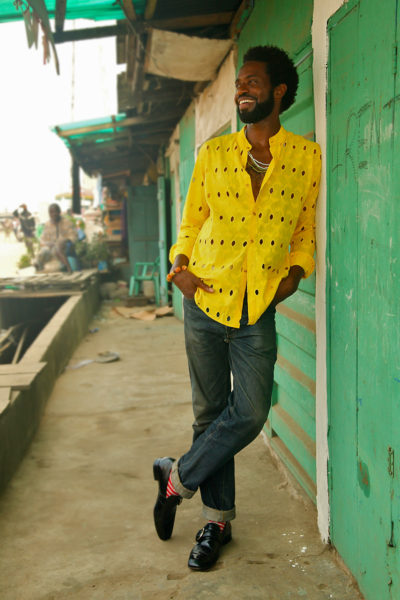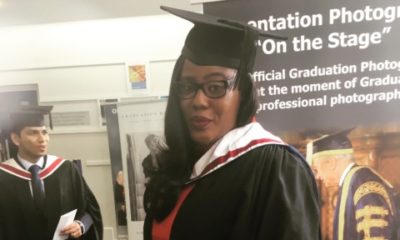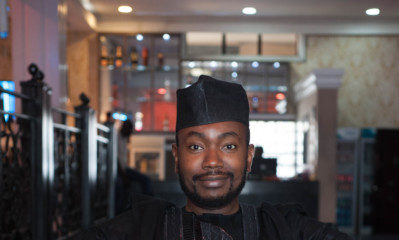Career
Move Back to Nigeria: Afro Soul Artiste Siji Awoyinka Says “Nigeria Is Not For Everybody”As He Shares The Highs & Lows of His Eclectic Journey
 Move Back to Nigeria is a series on BellaNaija which aims to encourage young and not-so-young professionals in the diaspora who are trying to make the decision of whether to move back to Nigeria. In collaboration with the brilliant team at MoveBackToNigeria.com, we hope to bring you a weekly interview with individuals who have successfully made the leap, considering the leap, as well as those who have tried it and realized it is not for them. MoveBacktoNigeria.com’s mission is to showcase stories of Nigerians abroad who have moved back home and are taking giant strides, often against all odds and to serve as inspiration to others. This, however does not preclude us from sharing stories of the people who have moved back and are facing various challenges.
Move Back to Nigeria is a series on BellaNaija which aims to encourage young and not-so-young professionals in the diaspora who are trying to make the decision of whether to move back to Nigeria. In collaboration with the brilliant team at MoveBackToNigeria.com, we hope to bring you a weekly interview with individuals who have successfully made the leap, considering the leap, as well as those who have tried it and realized it is not for them. MoveBacktoNigeria.com’s mission is to showcase stories of Nigerians abroad who have moved back home and are taking giant strides, often against all odds and to serve as inspiration to others. This, however does not preclude us from sharing stories of the people who have moved back and are facing various challenges.
Our spotlight this week is on Siji Awoyinka, US-based Afro-Soul Artiste and Filmmaker. He shares with us his interesting & inspiring story and how he followed his dreams: leading him from Nigeria to the UK and now the US. Read on for more on his fascinating & sometimes poignant story
Thanks for speaking with us: Can you please introduce yourself?
My name is Siji Awoyinka and I’m a singer-songwriter, producer and filmmaker. I was born in London to Nigerian parents, taken to Nigeria as a child, stayed for just over a decade, after which I returned to England and then eventually came to America.
Why did you leave after a decade? What prompted your exit from Nigeria?
I left when I was 17 after completing my high school education in Nigeria at the Federal Government College, Kaduna. We had gotten to a point in Nigeria during the mid-80s, where we had a succession of military rulers and the country was beginning to take a nose dive: universities were beginning to close and riots, strikes were all the rage… My mother then felt it was a good time for my brother and I to bail out before getting caught up in the storm that was fast brewing.
So you moved to the UK for your undergraduate studies?
Yes. I attended the University of Westminster, London to study Mechanical Engineering.
Was that what you wanted to study?
Not exactly, but I had the opportunity to and my grades were fortunately very good. The truth is, I wasn’t going to tell my father that I wanted to be a musician at that point. I had already caught the bug for performing and singing…but my father, you know, it wasn’t even discussed. I was either going to be a lawyer, a doctor or an engineer of some sort. I even went on to do a Masters degree as well, in Engineering Product Design at London’s Southbank University.
And this was immediately after your undergraduate degree?
Yes, it was. Once I had completed all my studies, I had fulfilled my obligations to my parents as far as my education was concerned and I was then free to pursue whatever I wanted. So, I plunged headlong into a musical career in London.
Please tell us about that.
I performed all over London in the 90s’ at various gigs such as Ronnie Scott’s, Smolensky’s, The Jazz Café, WKD
What kind of music do you perform?
My music is a hybrid of sorts; Soul mixed with jazz, the Blues, Yoruba rhythms. I call it “YorubaSoul” or “AfroSoul”.
Let’s get this right, after your educational exploits, you went headlong into music?
Oh yeah! You have to remember while studying for my engineering degree, I had already started to cut demos and explore music.
You knew that’s what you ultimately wanted to do…
All along, yes I did. It was an incredible time! I used my degree to earn money, so I could fund my recording sessions. I would work for months at a time, save up some of my earnings and then go into the studio to record some songs and demos. At some point, before graduating, one of my demo’s caught the attention of an A & R lady at Warner Brother Records, (Cynthia Cherry) who was working in London at the time. She really encouraged me to pursue my music actively if it’s something I wanted to do, because she felt I had the potential, so I just continued from there.
And then you left The UK, why?
I felt I had played the field in England as it were.
You got bored?
No, not so much. The reality of the UK scene at that time was that it felt very much like a pop world, and being the Soul music head that I am, I felt a need to be amongst or participate in an industry where that music and sound was being actively promoted and cultivated. America was where all the excitement was and it so happened that I’d just signed a music publishing deal with Warner Chapel who had offices in New York.
So I came out to New York, really loved the scene, met some incredible musicians, writers, performers, caught the bug and decided to make the move which I eventually did in 2000.
How was it in the US? Was the reception as stimulating as you had anticipated?
Completely so! It was a much bigger market, there were more opportunities which provided a level playing field where I cut my teeth and I was on my way. Furthermore, I was releasing records, meeting people; really honing my craft, cultivating and developing my sound. I got to really refine my musical ideas out here in America.
And today? Have you incorporated other interests into your career?
Yes, I have gotten into filmmaking as well.
Can we explore that?
I have a documentary called ‘Elders Corner’ (www.elderscornerfilm.com) and it’s a musical journey through Nigeria’s social and political history; I am using the lives and work of the music statesmen, the elder musicians to talk about key moments in the nation’s history.
Has that been released yet?
No. Over the last two years, I have travelled all over the world, filming, interviewing and capturing all the stories of all these icons of the high life era. We have finally finished filming and are now about to begin post-production. I always draw upon my experiences back home given that I identify strongly with Nigeria, the culture and its people. I always seek to channel that into my work.
But you don’t live there and you don’t work there?
No, I don’t. I haven’t done so for many years obviously. Interestingly, I’ve found a greater appreciation for the culture having lived outside the country. Having conducted research for the documentary, I regrettably found a large majority of folks back home to be culturally ignorant. We know nothing about our culture and don’t seem to care enough about it. We don’t seem to hold ourselves in high esteem either. But having lived in the diaspora and seen the appreciation, interest and reverence shown towards key aspects of our unique culture, music religion, I’ve come to appreciate ‘us’ a whole lot more.
Did you at any point feel that you had to move back home?
At some point, I felt it might be a great idea to explore opportunities back home. I also felt all the experience I have would serve me a great deal better back in Nigeria. I felt I had something to offer, was tired of complaining about the place being the way it was, so rather than complain, I decided do something about it, to make a difference in my own little way. Thus, I ventured home and like I said, I found it to be a different place.
How did you find the ‘new Nigeria’ in a sense?
Admittedly, I was driven home by a very strong sense of nostalgia. The Nigeria that I experienced as a child is no more. I found it frustrating, painful, disappointing. I voiced and complained bitterly about all the little things that got to me. It took a friend’s wife to say to me “stop focusing on the problems and begin to look at the opportunities that might lie behind solving them”.
After that, It seemed like a light bulb went off in my head. I began to see opportunities, instead of complaining, I changed my way of thinking, my way of approaching the place. I now accept Nigeria for what it is today. It is by no means perfect, but I know there are a lot of opportunities on ground; for the willing and dedicated and if you don’t mind getting your hands dirty, it can be very rewarding.
Do you intend to ever live in Nigeria or move back there at any point in your future?
For the last 3 years, I have been shuttling back and forth, trying to find my own way of engaging with Nigeria. I could live anywhere, I have come to realize home really is where you make it and home is ‘within’. I don’t think I am bound geographically by any one place. As long as I feel at home within me, I am at home, you know, I also don’t think living outside of the country makes me less of a Nigerian either.
Moving on slightly, can you talk us through your music today, the bulk of what defines you?
I grew up in the 70’s when there was Fela, Sunny Ade, Ebenezer Obey etcetera so I soaked up all of those influences in the Nigerian music scene. My father also had an incredibly diverse record collection which he brought back with him from London. All of these collectively influenced my musical taste.
I still speak the language (Yoruba) fluently and I was never too far removed from the culture, the food and so on. I may have been in a foreign land but I was surrounded by key aspects of the culture.
And now, any new music on the horizon?
Indeed. My third album will be released in the spring of this year. It’s titled ‘Home Grown’ and I intend to make the work available to listeners back home. “Lagos Lullabye” is the first single to be released from the album and should be available to download from my website shortly – www.sijimusic.com
Where do you see ‘Siji’ the brand in 3 to 5 years?
Showcasing our culture. I think we need to tell our own stories from our own unique perspective; we need to equip our youths with the needed skills to get their own voices heard. There is a huge demand, a huge market for what we do and there are a lot more stories we can be telling outside of our regular Nollywood films, such as documentaries, films that showcase our arts and who we are, etc. Our stories haven’t really been told from our own perspective and we have no archives to speak of either.
I am hoping to have some kind of platform where people can learn, and given that we are in a tech driven world, with the right tools we can almost effortlessly show the world the best of who we really are.
In conclusion, what would you say to people who might or not be considering moving back?
Nigeria is not for everybody, no country should live the way we live (without adequate infrastructures in place). But if you plan to move, know exactly what you are going back home to do. For those who haven’t been home in years, Nigeria has changed just as much as you have changed, but it is filled with opportunities if you are willing to do the work and get your hands dirty.
Many thanks for your time and best wishes moving forward.
________________________________________________________________________________
The primary objective of MoveBackToNigeria.com is to connect Nigerian professionals with various opportunities in Nigeria, ranging from recruitment drives to information & support regarding relocation processes, financial & tax advice and much more. Move Back To Nigeria also features social interest topics such as what’s on, where to live, how-to survival tips and so on. Consistently engaging with and featuring Nigerian professionals in weekly interviews, Move Back To Nigeria regularly publishes social interest articles relevant to the general public. Everyone is welcome to their online discussions & fora and you are invited to air your views & suggestions on the topical and trending matters section. For more information and further inquiries, please contact [email protected].

























